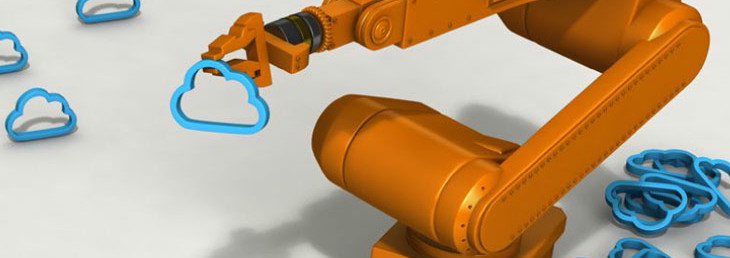#28 Co-Session (I): The convergence of the physical and the digital factory

Contrary to what you might think from reading most media headlines, it’s not just the service sector that is being transformed by digitalisation. Industry is also facing a new revolution of its own due to digitalization, which some historically consider as the fourth one after the first one about mechanisation and the steam engine, the second one powered by production line and electricity, and a third one based on automation and the use of computers. This is the reason why we wanted to dedicate this Co-Session to what is happening and is about to happen in industrial innovation and in relation to the so-called Industry 4.0, a new industry consisting of intelligent factories in which processes will be managed by cyber-physical systems with markedly lower human intervention.
For this reason and because, in fact, 75% of European exports today are still about manufactured products and 80% of innovations from the Old Continent come from industrial environments. These were some of the figures given in the initial presentation on the state of the art of Industry 4.0 by Oriol Pascual, director of the IQS Tech Factory, the Institut Químic de Sarrià centre for entrepreneurship that was our host on this occasion.
The convergence of the physical and the digital factory
But if there is a company that is most committed to pursuing the idea of turning the concept of Industry 4.0 into reality it is Siemens. Its Electronic Works manufacturing plant in Amberg (EWA) in Germany is surely the best place in the world today to take a look at the intelligent factory of the future where the physical and the digital converge. EWA is the most advanced example of the Digital Enterprise Platform that the German corporation wants to make standard within a decade.
This Co-Session was attended by José Díez, who works in the Siemens department dedicated to simulation. José provided some figures that prove that the concept of the Smart Factory is somewhat more than just a buzzword for this company: since 2007, the company has invested over 9.500 million euros in innovation and strategic acquisitions related to Industry 4.0. The sole aim is to bring about the changes in the manufacturing process that Siemens considers necessary to respond to two main tendencies: products with an increasingly short lifecycle, and with more variety, with companies having doubled their number of products and their different variants over the last 15 years.
Making Smart factories a reality in a large industrial group
Although the concept of Industry 4.0 emerged in and has been mainly promoted by Germany, there are already outstanding examples outside its borders. This is the case of the Basque group Danobat Group, European leader in machine tool manufacture. This was highlighted by Nerea Aranguren, the head of the Group’s technology centre, who was categorical at the start of her presentation: “Industry 4.0 is not a trend. It is already a reality, it is happening, it is already here”. For example, the Group puts forward a new type of advanced machine tool as the only way to be able to compete with the “middle of the road” machinery from Asian manufacturers.
The freight train maintenance facility that Danobat has set up in the middle of the vast Australian desert is another example of turnkey solutions. Its location is so remote that the difficulty in finding staff willing to work there has led to the need for a very high level of automation well above the usual. Danobat Group’s digital laboratory also works on some of the elements that will be needed to make up the factory of the future, from new human-machine interfaces with levels of usability similar to those which we have become accustomed to with iPhones, to all kinds of intelligent components that will make it possible for machines to not only know what is happening but also what is going to happen.
Analysing manufacturing of Smart connected products
Industry 4.0, however, will not just be about technological innovation. It will also imply changes in the economic model of manufacturing companies and in how they understand the manufacturing business. Carles Cosials offered his expert view on this new industrial paradigm based on his experience in Integral PLM Experts, a consulting firm that specialises in improving processes involved in production and product design. For Carles, “monitoring” jobs will be the new norm in factories with increasingly less human intervention. The factory is no longer just a physical manufacturing space, but the place where data is gathered that make possible the gains in efficiency, speed and flexibility promised by Industry 4.0.
The idea of an “outcome economy” will therefore dominate, which turns product lifecycle management into an endless loop of continuous improvement and evolution and allows products to be transformed into “serviproducts” that will be paid for according to their results. If manufacturing improvements have meant reducing deviations over the last 150 years, Industry 4.0 consists of accepting diversity as the norm and with the ideal situation being able to manufacture series of one unit.
The challenge of future factories
Towards the end of the day, the founder of Co-Society, Alfons Cornella, gave a presentation on the industry of the future with the twin aim of showing a transversal approach to the issue and, in passing, make some brief points on certain technologies, companies and products that were not touched upon in previous presentations. These included new models for business and market access that make it possible to add sensors and connectivity to products, with companies like GE moving from selling cars to “offering locomotion”, and new industrial practices that permit this convergence between industrial and digital aspects, such as predictive maintenance or remote management.
This was also a good time to talk about advances in robotics and the growing social debate on its potential effect on unemployment rates; how to stimulate vocations in industrial degrees in people who will have to work in the factories of the future; on how Artificial Intelligence could affect industrial processes; on how rapid innovation in 3D printing will change (it is already changing) the way in which products are manufactured today; and about how advances in nanotechnology and nanofabrication open up a new world of products to be made and materials to manufacture them.
